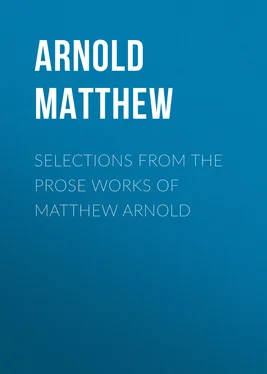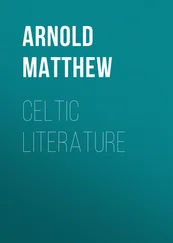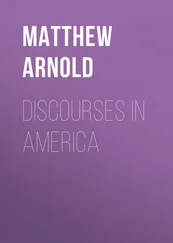Matthew Arnold - Selections from the Prose Works of Matthew Arnold
Здесь есть возможность читать онлайн «Matthew Arnold - Selections from the Prose Works of Matthew Arnold» — ознакомительный отрывок электронной книги совершенно бесплатно, а после прочтения отрывка купить полную версию. В некоторых случаях можно слушать аудио, скачать через торрент в формате fb2 и присутствует краткое содержание. Жанр: foreign_prose, literature_19, foreign_antique, на английском языке. Описание произведения, (предисловие) а так же отзывы посетителей доступны на портале библиотеки ЛибКат.
- Название:Selections from the Prose Works of Matthew Arnold
- Автор:
- Жанр:
- Год:неизвестен
- ISBN:нет данных
- Рейтинг книги:5 / 5. Голосов: 1
-
Избранное:Добавить в избранное
- Отзывы:
-
Ваша оценка:
- 100
- 1
- 2
- 3
- 4
- 5
Selections from the Prose Works of Matthew Arnold: краткое содержание, описание и аннотация
Предлагаем к чтению аннотацию, описание, краткое содержание или предисловие (зависит от того, что написал сам автор книги «Selections from the Prose Works of Matthew Arnold»). Если вы не нашли необходимую информацию о книге — напишите в комментариях, мы постараемся отыскать её.
Selections from the Prose Works of Matthew Arnold — читать онлайн ознакомительный отрывок
Ниже представлен текст книги, разбитый по страницам. Система сохранения места последней прочитанной страницы, позволяет с удобством читать онлайн бесплатно книгу «Selections from the Prose Works of Matthew Arnold», без необходимости каждый раз заново искать на чём Вы остановились. Поставьте закладку, и сможете в любой момент перейти на страницу, на которой закончили чтение.
Интервал:
Закладка:
For the practical man is not apt for fine distinctions, and yet in these distinctions truth and the highest culture greatly find their account. But it is not easy to lead a practical man,—unless you reassure him as to your practical intentions, you have no chance of leading him,—to see that a thing which he has always been used to look at from one side only, which he greatly values, and which, looked at from that side, quite deserves, perhaps, all the prizing and admiring which he bestows upon it,—that this thing, looked at from another side, may appear much less beneficent and beautiful, and yet retain all its claims to our practical allegiance. Where shall we find language innocent enough, how shall we make the spotless purity of our intentions evident enough, to enable us to say to the political Englishmen that the British Constitution itself, which, seen from the practical side, looks such a magnificent organ of progress and virtue, seen from the speculative side,—with its compromises, its love of facts, its horror of theory, its studied avoidance of clear thoughts,—that, seen from this side, our august Constitution sometimes looks,—forgive me, shade of Lord Somers! 42 42 ~John Somers, Baron Somers~ (1651-1716), was the most trusted minister of William III, and a stanch supporter of the English Constitution. See Addison, The Freeholder , May 14, 1716, and Macauley's History , iv, 53.
—a colossal machine for the manufacture of Philistines? How is Cobbett 43 43 ~William Cobbett~ (1762-1835). English politician and writer. As a pamphleteer his reputation was injured by his pugnacity, self-esteem, and virulence of language. See Heine, Selections , p. 120, [Transcriber's note: This is Footnote 144 in this e-text] and The Contribution of the Celts, Selections , p. 179.[Transcriber's note: This is Footnote 257 in this e-text.]
to say this and not be misunderstood, blackened as he is with the smoke of a lifelong conflict in the field of political practice? how is Mr. Carlyle to say it and not be misunderstood, after his furious raid into this field with his Latter-day Pamphlets? 44 44 ~Carlyle's~ Latter-Day Pamphlets (1850) contain much violent denunciation of the society of his day.
how is Mr. Ruskin, 45 45 ~Ruskin~ turned to political economy about 1860. In 1862, he published Unto this Last , followed by other works of similar nature.
after his pugnacious political economy? I say, the critic must keep out of the region of immediate practice in the political, social, humanitarian sphere, if he wants to make a beginning for that more free speculative treatment of things, which may perhaps one day make its benefits felt even in this sphere, but in a natural and thence irresistible manner.
Do what he will, however, the critic will still remain exposed to frequent misunderstandings, and nowhere so much as in this country. For here people are particularly indisposed even to comprehend that without this free disinterested treatment of things, truth and the highest culture are out of the question. So immersed are they in practical life, so accustomed to take all their notions from this life and its processes, that they are apt to think that truth and culture themselves can be reached by the processes of this life, and that it is an impertinent singularity to think of reaching them in any other. "We are all terræ filii ," 46 46 ~terrae filii~. Sons of Mother Earth; hence, obscure, mean persons.
cries their eloquent advocate; "all Philistines 47 47 See Heine, Selections , Note 2, p. 117.[Transcriber's note: This is Footnote 140 in this e-text.]
together. Away with the notion of proceeding by any other course than the course dear to the Philistines; let us have a social movement, let us organize and combine a party to pursue truth and new thought, let us call it the liberal party , and let us all stick to each other, and back each other up. Let us have no nonsense about independent criticism, and intellectual delicacy, and the few and the many. Don't let us trouble ourselves about foreign thought; we shall invent the whole thing for ourselves as we go along. If one of us speaks well, applaud him; if one of us speaks ill, applaud him too; we are all in the same movement, we are all liberals, we are all in pursuit of truth." In this way the pursuit of truth becomes really a social, practical, pleasurable affair, almost requiring a chairman, a secretary, and advertisements; with the excitement of an occasional scandal, with a little resistance to give the happy sense of difficulty overcome; but, in general, plenty of bustle and very little thought. To act is so easy, as Goethe says; to think is so hard! 48 48 ~To think is so hard~. Goethe's Wilhelm Meister's Apprenticeship , Book VII, chap. IX.
It is true that the critic has many temptations to go with the stream, to make one of the party movement, one of these terræ filii ; it seems ungracious to refuse to be a terræ filius , when so many excellent people are; but the critic's duty is to refuse, or, if resistance is vain, at least to cry with Obermann: Périssons en résistant 49 49 See Sénancour's Obermann , letter 90. Arnold was much influenced by this remarkable book. For an account of the author (1770-1846) and the book see Arnold's Stanzas in Memory of the Author of "Obermann ," with note on the poem, and the essay on Obermann in Essays in Criticism , third series.
.
How serious a matter it is to try and resist, I had ample opportunity of experiencing when I ventured some time ago to criticize the celebrated first volume of Bishop Colenso. 50 50 So sincere is my dislike to all personal attack and controversy, that I abstain from reprinting, at this distance of time from the occasion which called them forth, the essays in which I criticized Dr. Colenso's book; I feel bound, however, after all that has passed, to make here a final declaration of my sincere impenitence for having published them. Nay, I cannot forbear repeating yet once more, for his benefit and that of his readers, this sentence from my original remarks upon him; There is truth of science and truth of religion; truth of science does not become truth of religion till it is made religious. And I will add: Let us have all the science there is from the men of science; from the men of religion let us have religion.[Arnold.] ~John William Colenso~ (1814-83), Bishop of Natal, published a series of treatises on the Pentateuch , extending from 1862-1879, opposing the traditional views about the literal inspiration of the Scriptures and the actual historical character of the Mosaic story. Arnold's censorious criticism of the first volume of this work is entitled The Bishop and the Philosopher ( Macmillan's Magazine , January, 1863). As an example of the Bishop's cheap "arithmetical demonstrations" he describes him as presenting the case of Leviticus as follows: "' If three priests have to eat 264 pigeons a day, how many must each priest eat? ' That disposes of Leviticus." The essay is devoted chiefly to contrasting Bishop Colenso's unedifying methods with those of the philosopher Spinoza. In passing, Arnold refers also to Dr. Stanley's Sinai and Palestine (1856), quotations from which are characterized as "the refreshing spots" in the Bishop's volume.
The echoes of the storm which was then raised I still, from time to time, hear grumbling round me. That storm arose out of a misunderstanding almost inevitable. It is a result of no little culture to attain to a clear perception that science and religion are two wholly different things. The multitude will forever confuse them; but happily that is of no great real importance, for while the multitude imagines itself to live by its false science, it does really live by its true religion. Dr. Colenso, however, in his first volume did all he could to strengthen the confusion, 51 51 It has been said I make it "a crime against literary criticism and the higher culture to attempt to inform the ignorant." Need I point out that the ignorant are not informed by being confirmed in a confusion? [Arnold.]
and to make it dangerous. He did this with the best intentions, I freely admit, and with the most candid ignorance that this was the natural effect of what he was doing; but, says Joubert, "Ignorance, which in matters of morals extenuates the crime, is itself, in intellectual matters, a crime of the first order." 52 52 Joubert's Pensées , ed. 1850, II, 102, titre 23, 54.
I criticized Bishop Colenso's speculative confusion. Immediately there was a cry raised: "What is this? here is a liberal attacking a liberal. Do not you belong to the movement? are not you a friend of truth? Is not Bishop Colenso in pursuit of truth? then speak with proper respect of his book. Dr. Stanley 53 53 ~Arthur Penrhyn Stanley~ (1815-81), Dean of Westminster. He was the author of a Life of (Thomas) Arnold , 1844. In university politics and in religious discussions he was a Liberal and the advocate of toleration and comprehension.
is another friend of truth, and you speak with proper respect of his book; why make these invidious differences? both books are excellent, admirable, liberal; Bishop Colenso's perhaps the most so, because it is the boldest, and will have the best practical consequences for the liberal cause. Do you want to encourage to the attack of a brother liberal his, and your, and our implacable enemies, the Church and State Review or the Record ,– the High Church rhinoceros and the Evangelical hyena? Be silent, therefore; or rather speak, speak as loud as ever you can! and go into ecstasies over the eighty and odd pigeons."
Интервал:
Закладка:
Похожие книги на «Selections from the Prose Works of Matthew Arnold»
Представляем Вашему вниманию похожие книги на «Selections from the Prose Works of Matthew Arnold» списком для выбора. Мы отобрали схожую по названию и смыслу литературу в надежде предоставить читателям больше вариантов отыскать новые, интересные, ещё непрочитанные произведения.
Обсуждение, отзывы о книге «Selections from the Prose Works of Matthew Arnold» и просто собственные мнения читателей. Оставьте ваши комментарии, напишите, что Вы думаете о произведении, его смысле или главных героях. Укажите что конкретно понравилось, а что нет, и почему Вы так считаете.












